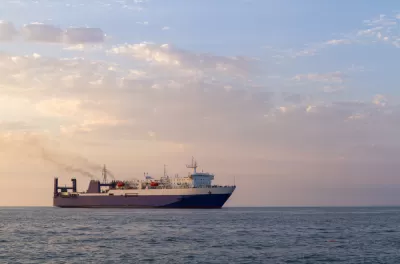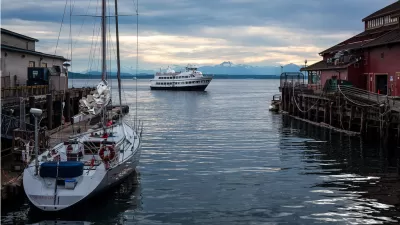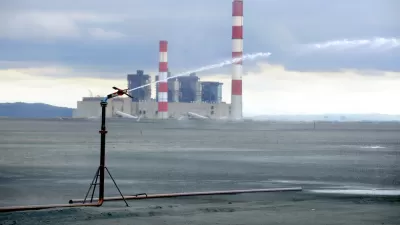A 2016 rule approved by a specialized agency of the U.N. is forcing large ships that burn bunker oil, the dirtiest type of fuel, to either burn a more costly low-sulfur variety, apply scrubbers, or turn to LNG.

"In all the controversy over toxic air pollution from diesel cars, little is heard of a worse source of pollution – shipping," reported Jeremy Plester for The Guardian on May 18, 2017.
Large ocean-going ships tend to use bunker fuel, the world’s dirtiest diesel fuel – a toxic, tar-like sludge that usually contains 3,500 times more sulphur than the diesel used for cars. And it’s also cheap.
But that's all due to change radically in two years thanks to the International Maritime Organization (IMO), a United Nations specialized agency charged with "responsibility for the safety and security of shipping and the prevention of marine and atmospheric pollution by ships." Their target: reduce "sulphur oxides (SOx) which are known to be harmful to human health, causing respiratory symptoms and lung disease."
In 2016, IMO approved a transformation program known as Sulphur 2020 that will require vessels to dramatically reduce the sulfur content of the fuel they burn today, which can be as high as 3.5 percent. According to the program:
From 1 January 2020, the limit for sulphur in fuel oil used on board ships operating outside designated emission control areas will be reduced to 0.50% m/m (mass by mass). This will significantly reduce the amount of sulphur oxides emanating from ships and should have major health and environmental benefits for the world, particularly for populations living close to ports and coasts.
"The bunker fuel sulfur reduction in 2020 will potentially be the most disruptive product quality change in decades," IHS Markit energy analyst Stephen Jew told Peter Tirschwell of The Journal of Commerce on Aug 06, 2017.
According to the International Chamber of Shipping, the cost of compliant low-sulfur fuel is currently about 50 percent more than the cost of residual [or conventional bunker] fuel, and as demand for low-sulfur fuel grows after 2020, the differential will widen.
"The rule change marks a seismic shift for the shipping and refining sectors," reported Reuters on Apr. 11.
Philip K. Verleger, an economist and consultant focusing on the energy markets, takes it up a notch in a Bloomberg Opinion on Apr. 18, warning that the rule could cause "a spike in oil prices large enough to threaten global recession."
The attraction of liquefied natural gas (LNG)
Paul Garvy, reporting (partial paywall) for The Wall Street Journal on Aug. 23, found that some shipping and cruise line companies were complying with the new regulation by abandoning bunker oil altogether by ordering ships powered by clean-burning liquefied natural gas (LNG) which has virtually no sulfur. However, they are a minority. His article is recapped in The Wall Street Energy Journal (no paywall):
The shipping industry currently consumes about five million barrels a day of oil, and most of the industry is expected to meet the new obligations by either switching to more expensive low-sulfur fuels or installing ”scrubbers” that clean sulfur out of exhaust fumes.
"Every year the percentage of LNG powered ships out of the new-build market is increasing," reported Julie Gordon for Reuters on June 28.
Part of the draw of LNG over low-sulfur diesel or other alternative fuels is that even if emissions standards become more stringent in the future, natural gas falls well below any threshold.
In terms of cost, building a new ship to run off LNG is comparable with traditional diesel fuel-powered ships. But the fuel savings are immense.
“The fuel costs to operate on LNG is approximately half of what it cost to operate on ultra-low sulfur marine diesel,” said Deborah Marshall, a spokeswoman for B.C. Ferries, which runs four LNG ferries in the West Coast province.
More costly but lives will be saved
IMO cites a study showing that the switch to .5 percent sulfur bunker oil will prevent "570,000 additional premature deaths worldwide between 2020-2025." In addition, they note that "SOx can lead to acid rain, which can harm crops, forests and aquatic species, and contributes to the acidification of the oceans."
FULL STORY: The New Gas Market: Shipowners Needing Cleaner Fuel

Study: Maui’s Plan to Convert Vacation Rentals to Long-Term Housing Could Cause Nearly $1 Billion Economic Loss
The plan would reduce visitor accommodation by 25,% resulting in 1,900 jobs lost.

North Texas Transit Leaders Tout Benefits of TOD for Growing Region
At a summit focused on transit-oriented development, policymakers discussed how North Texas’ expanded light rail system can serve as a tool for economic growth.

Alabama: Trump Terminates Settlements for Black Communities Harmed By Raw Sewage
Trump deemed the landmark civil rights agreement “illegal DEI and environmental justice policy.”

How Community Science Connects People, Parks, and Biodiversity
Community science engages people of all backgrounds in documenting local biodiversity, strengthening connections to nature, and contributing to global efforts like the City Nature Challenge to build a more inclusive and resilient future.

Alabama: Trump Terminates Settlements for Black Communities Harmed By Raw Sewage
Trump deemed the landmark civil rights agreement “illegal DEI and environmental justice policy.”

Dear Tesla Driver: “It’s not You, It’s Him.”
Amidst a booming bumper sticker industry, one writer offers solace to those asking, “Does this car make me look fascist?”
Urban Design for Planners 1: Software Tools
This six-course series explores essential urban design concepts using open source software and equips planners with the tools they need to participate fully in the urban design process.
Planning for Universal Design
Learn the tools for implementing Universal Design in planning regulations.
City of Santa Clarita
Ascent Environmental
Institute for Housing and Urban Development Studies (IHS)
City of Grandview
Harvard GSD Executive Education
Toledo-Lucas County Plan Commissions
Salt Lake City
NYU Wagner Graduate School of Public Service




























